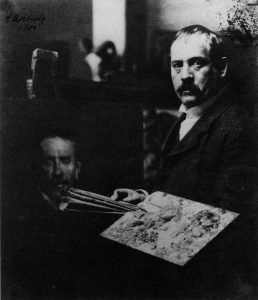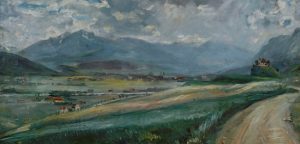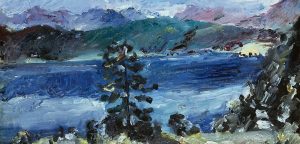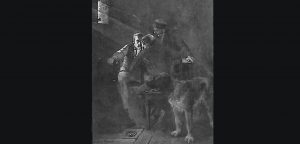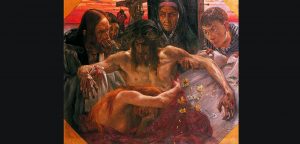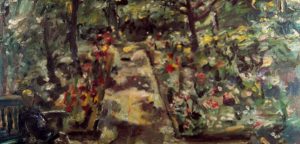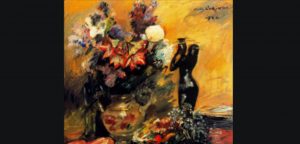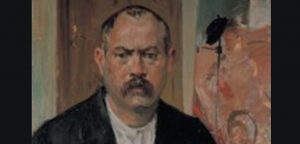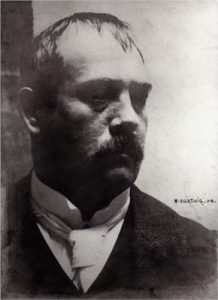Lovis Corinth was born on July 21, 1858 in the city of Tapiau (currently Gvardeisk of the Kaliningrad region).
1858 - 1925
Lovis Corinth
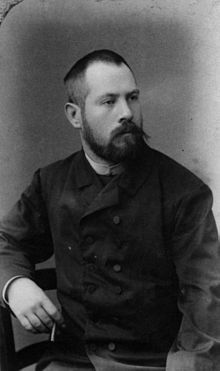
description
A German impressionist painter, one of the leading figures of art in Germany at the turn of the ХІХ and ХХ centuries.
The artist’s parents kept a farm and a leather workshop. In the years 1866-1873, he studied at the Kneiphof Grammar School in Konigsberg, living with his aunt.
Lovis Corinth worked in the style of “German impressionism”, subsequently reached the heights of Expressionism. The artist’s early works were created in the most naturalistic manner.
He was a member of the Berlin Secession, later replaced Max Lieberman as a chairman. L. Corinth participated in social activities; his paintings were popular and best-selling. The work of the painter is a synthesis of Impressionism and Expressionism. Artist’s canvases were victims of the Third Reich. When the Nazis came to power, his paintings were declared “destructive”; they were confiscated from art salons and galleries; many talented works were destroyed.
Key ideas:
– Lovis Corinth, a talented portrait painter and master of the image of a naked female body, created a large number of both his own and others’ portraits in an inimitable expressive style. Corinth’s paintings based on biblical and mythological scenes are characterized by their tension and the stunning expressiveness of images. Landscapes and still lifes are filled with indomitable life force, transmitted by an energetic stroke.
– The artist’s manner is so emotional and sensual that it inevitably causes the same strong emotional reaction of the viewer. Paintings evoke a variety of feelings, ranging from admiration and ending with disgust, but just do not leave anyone indifferent.
– Thanks to the influence of the Impressionist school, the works of Corinth gradually become brighter, more vivid, and the expressive means more expressive. The artist created portraits and landscapes of extraordinary vitality and temperament. The themes of the paintings are varied – from high biblical themes to human nude.
1858
1873
1880
1884
1890
1901
1909 - 1919
1918
1925
The birth of the artist
Entered the art academy in Konigsberg
After the death of his mother, Lovis Corinth’s father sold his estate in Tapiau and enrolled his son at the art academy in Konigsberg. His teacher was Otto Gunter, who taught the basics of painting and historical painting.
Entered the Academy of Fine Arts in Munich
Entered the Academy of Fine Arts in Munich, which at that time was the progressive center of German painting, and played a large role in the cultural life of the city.
“The Conspiracy”
The first international success: the painting “The Conspiracy” was awarded the bronze medal of the prestigious London Salon. At the same time, the portrait “Negro Othello” created a furor at an exhibition in the Dutch city of Antwerp.
“The Pieta” (“Descent from the Cross”) received an award at the Paris Salon
After several failures, the painting “The Pieta” (“Descent from the Cross”) received an award at the Paris Salon. The following year, the artist again moved to Munich.
Moved to Berlin and became a member of the Berlin Secession
Moved to Berlin and became a member of the Berlin Secession, and later its chairman. Berlin period was the flowering of the painter’s art. At this time, the most famous canvases were created, including the “Reclining Nude”, which caused and continues to elicit mixed reviews from experts and art lovers.
He painted many pictures and drew
Began to spend a lot of time in the resort of Nienhagen near Bad Doberan. Despite the fact that he experienced apoplexy, he painted many pictures and drew.
Berlin Secession arranged an exhibition on the occasion of the 60th anniversary of Lovis Corinth
Berlin Secession arranged an exhibition on the occasion of the 60th anniversary of Lovis Corinth.
The death of the artist
The artist died on July 7, 1925 in Zandvoort, the Netherlands.
Lovis Corinth
On Artist
flow
Realism
friends
Max Lieberman
Max Klinger
Wilhelm Leibl
Walter Leistikov
Karl Stauffer-Bern
Thomas Theodore Heine
Fritz von Ude
Max Slevogt
artists
Otto Gunter
Albert Brendel
Frederick Preller
Franz von Defregger
Ludwig von Löfz
Wilhelm Trubner
Jean-Louis-Ernest Meyssonier
Jules Bastien-Lepage
By Artist
flow
Expressionism
friends
Wilhelm Leibl
Hans Olde
Burnt Gränwold
Otto Ekman
Karl Stratman
Peter Behrens
artists
Charlotte Berend-Corinth
Erich Lasse

